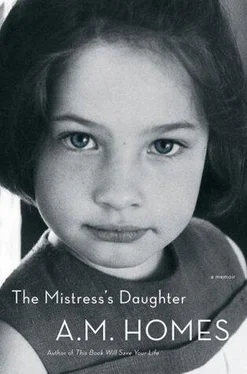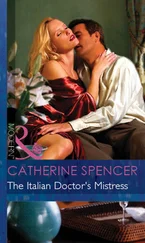“I am always searching,” I say, “but no, I have not searched in that way.”
December 18, 1993. My birthday, the lightning rod, the axis around which I spin. I hold myself braced against it — an anticelebration.
How can a person with no history have a birthday? Are you sure it’s my birthday? Are you sure of how old I am? How do you know? What proof do you have?
I was born in 1961. My birth certificate was issued in 1963. Is that normal? Was there a delay because I belonged to no one, hovered in limbo land, waiting to become someone?
For those two missing years did I have another name?
To add to the confusion, my birthday is in the middle of the holiday season; it features not only all the standard natal elements, but also the ongoing and age-old battle of the Christians versus the Jews, which oddly turns out to be among the battles of my biological origins.
December, the season of joy, is the season of my secret sorrows.
Every year I cannot help but think of the woman who gave me away. I find myself missing someone I never knew, wondering, Does she miss me? Does she shop for the things I buy myself? Does my father know I exist? Do I have siblings? Does anybody know who I am? I spend weeks grieving.
At this point it would take nothing short of a national monthlong festival, a public parade celebrating my existence, to reassure me that my presence on this planet is welcome. And even then I’m not sure I would believe it, I’m not sure I wouldn’t doubt that it was an attempt to humor me, to temporarily cajole me out of a black hole.
And this year is something entirely new, more awful, like going back to scratch and starting all over again, a new birthday with an old child, the first with four parents instead of two, a schizoid dividing of the zygote further than the gods intended it to go.
Everyone is at me, wanting something.
My parents, who usually do nothing, are trying to plan a trip to New York. I quickly put them off.
And Ellen is calling me every night begging that she be allowed to see me, feeling that in some way this is her birthday too.
“It’s your birthday,” she says. “Please, pretty please.” And she starts to cry, and then there is the click of the lighter and “Can you hold on for a minute while I get a drink of water?”
She writes a letter saying that Decembers have plagued her for the last thirty-one years, she finds them excruciating, depressing, and so forth. And while it’s nice to know I was never forgotten, it’s stranger still that I am never known.
Norman calls asking if I’ve “got any big plans.” He says he is sending something; he has spoken with Ellen about what would be a good gift and he’s putting it in the mail — insured, overnight express, to be sure it gets there in time.
I spend the official day in hiding. I turn off the phone, I don’t answer the buzzer.
Later I go downstairs and find that people have left me flowers and gifts, similar to the way strangers leave offerings at scenes of tragic accidents. My friends have created a veritable altar to the birthday girl: an FTD Pick Me Up bouquet, a get-well card, and so on.
Norman sent a small heart-shaped gold locket, the kind that snaps open and you put two pictures in, the kind that you’d give a little girl. It is such a strange gift for a thirty-two-year-old. Is this jewelry? It is more like pre-jewelry, like a training bra. (For Christmas he will send me a thin cashmere sweater — which will make me wonder, is this the kind of “cashmere sweater” Ellen was referring to?)
Ellen sends a birthday card meant for a small child — shaped like a teddy bear, signed, “Love, Mommy Ellen.” She sends a kiddie card, a silky nightgown negligee like something Mrs. Robinson would wear, and a box of homemade candy from her favorite Atlantic City candy store. The chocolate is thick, heavy, rolled, filled — it looks like it could bend your mind. I can’t keep the things she sends me and I can’t throw them out either. I give the chocolate away. That evening I make each of my friends take a piece, like communion wafers, bits of the mother. “Here,” I say pushing the box forward, refusing to try one myself. “Take one,” and I watch to see how it goes down.
Christmas Eve — it’s a year since this started unfolding. I’m on the train to Washington — it’s packed, the mood is festive, the luggage racks are bursting with ornately wrapped packages. I’m bringing presents even though my mother has told me we don’t celebrate Christmas. The fact is we don’t celebrate Hanukkah either.
We handle the holidays by pretending they aren’t happening, by ignoring them. We hold our breath — it’ll pass. An invisible cloud hangs over the house, a depressed charcoal gray, like the set for a Eugene O’Neill play.
Some part of me thinks it’s not hard to have a decent holiday; you choose what holiday you like and you celebrate. Every year I become all the more determined that I will do it for myself, I will make my own holiday.
The winter I turned nine, I was fixated on having a Christmas tree. It made no sense to me that all up and down the block every house except ours had a tree.
“We’re Jewish,” my mother said. “Jews don’t have trees.”
“We weren’t always Jewish, were we?” Until then we’d always celebrated Christmas, a treeless Christmas, but Christmas nonetheless. I remembered leaving a plate of cookies for Santa, waking to find it empty, replaced by a long red stocking hanging from the fireplace, an orange bulging in the toe, walnuts spilling out the top, presents on the hearth. It wasn’t my imagination. Until then we’d been like everyone else, and then suddenly we were different.
“I was wrong,” my mother said. “It was my error. Jews don’t celebrate Christmas, we have Hanukkah, the Festival of Lights.”
“But the Solomons next door are Jewish too, and they have a tree.”
“That’s their problem,” she said.
It wasn’t as though we were especially religious. On Yom Kippur, the highest of the holy days, the Day of Atonement, a day of fasting, we paused only momentarily for God to count us in and then ate a late breakfast. But now, without warning, Christmas had changed its name to Hanukkah. It came early and lasted for eight days, like a plague.
We gathered around a menorah and lit the candles — no one knew the prayer; instead we said thanks. And thanks a lot. And is it returnable?
After the fourth night my brother refused to participate. “I’ve had more than enough,” he said, refusing to leave his room.
From my bedroom window I could see the neighbors’ tree twinkling with glass icicles, miniature white lights, colored balls, tinsel.
On the day after Christmas, my mother took me to the library. Next to the library was a Christmas tree lot. I sneaked over and talked to the guy. It took a surprising effort to convince him — on the day after Christmas — to take pity on a nine-year-old who lived in a house without a tree, but he finally gave me a puny Christmas tree. I dragged it to the car, stuffed it in the backseat, met my mother back in the library. I was bursting with excitement at my ingenious sneakery, beside myself with joy. Back at the house, I slipped out and was dragging the tree from the car, into the house, when my mother started yelling, “What are you doing? You can’t bring that in here, it’s a tree.”
“Why not, why not? It’s just a tree.”
“Not in the living room, you’re not going to put that in the living room.”
“Why can’t we be like everyone else?”
“Because we’re Jewish,” my mother said.
And so the tree went in my room. I knew nothing about trees, about tree stands; I put it in a Maxwell House coffee can. The tree listed to one side. I propped it against the wall. It was a pathetic tree, scrawny, a tree no one wanted. But it was my tree, my Charlie Brown tree. I loved my tree, I watered it, decorated it with construction-paper loop chains and popcorn on a thread. Despite my good care, the tree died; it went from green to brown and brittle. As I dragged the tree out of the house, the needles, once soft and supple, now sharp like thorns, fell everywhere. I dragged the tree out of the house, across the yard, down around back, and hurled it down the hill. Back inside, my mother already had the Electrolux out and was working the long wand, the power brush, up and down the hall.
Читать дальше












